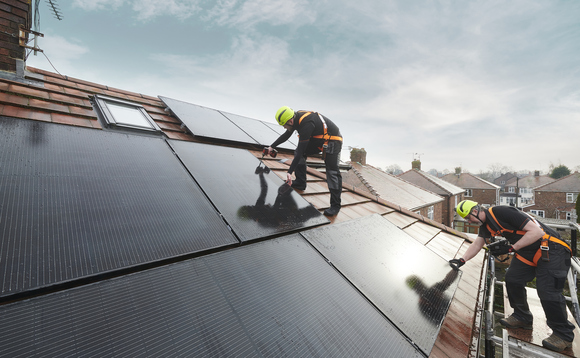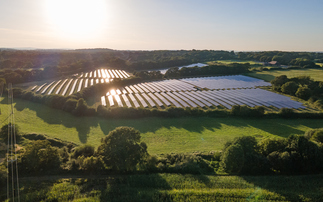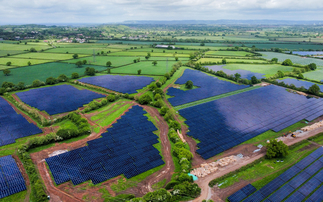Solar Taskforce meets for the first time, as government underscores its commitment to turbocharging roll out of rooftop solar arrays
The solar industry and government have agreed that ramping up solar power capacity on commercial and public rooftops should be a top priority as the UK looks to deliver on its clean energy goals.
In a statement issued after the first meeting of a government-convened Solar Taskforce yesterday, trade body Solar Energy UK and the Department for Energy Security and Net Zero (DESNZ) jointly hailed the "untapped potential" for deploying solar arrays at commercial sites.
Panels installed on schools, commercial buildings, warehouses, and car parks should be at the "forefront of a revolution in affordable solar power" that would enable the government to meet its target of increasing UK solar power capacity nearly five-fold to 70GW by 2035 while minimising the impact on land use, according to the update.
The taskforce, led by Energy Security and Net Zero Minister Graham Stuart and Solar Energy UK chief executive Chris Hewett, was established by DESNZ earlier this spring, after the government accepted a recommendation from Chris Skidmore's Net Zero Review that called for closer collaboration between policymakers and the solar industry.
Solar Energy UK said it expects 2023 to be a record year for solar installations, noting the current rate of installation could see 230,000 sites come online across the year - beating the record set in 2011 when the government's subsidy scheme was in full force.
Stuart noted the UK could be doing significantly more to boost solar generation by ramping up rooftop generation.
"Households across the UK are already doing their bit to provide cleaner, cheaper and more secure energy sources with the solar panels on their roofs - but with acres of rooftop space on car parks and supermarkets in every community, we can be doing even more," he said.
"This new dedicated Solar Taskforce will have a laser-like focus on cutting the costs and breaking down the barriers to harnessing the power of the sun in every way we can, all while using a small fraction of this country's land."
The Taskforce comes after a fraught 12 months for the UK solar industry, after former Prime Minister Liz Truss repeatedly framed solar farm development as a threat to UK farming, and then set in motion plans to place new restrictions on where ground-mounted panels could be installed - a scheme that later axed by her successor Rishi Sunak.
Solar Energy UK's Chris Hewett said he was "delighted" that industry leaders were now working directly with government "to resolve the stumbling blocks and maximise the benefits that solar energy offers to the nation".
"Solar is the most popular form of power generation amongst the British public and consumer demand has never been higher, though the rate of rooftop installation must double to help hit 70GW by 2035," Hewett said. "The number of solar farms will also have to increase significantly."
The taskforce also discussed plans to publish a solar roadmap next year which would drive forward the actions needed to deliver the UK's ambition for 70GW of solar power by 2035. Workforce retraining and upskilling, job creation, and building out UK solar supply chains were also topics of discussion, according to the update.
Solar Energy UK's senior communications advisor Gareth Simkins said he had been positively energised by the discussions. "I can't reveal what was said at the inaugural Solar Taskforce yesterday - but I can say I came out of it feeling positively chipper about the industry's future," he said.
It remain to be seen what policy proposals come out of the new taskforce, but the industry has long argued that planning reform, faster grid connections, tax breaks, more ambitious skills programmes, and a more supportive policy regime for energy storage systems could all help to accelerate the roll out of solar arrays on commercial properties.
The news comes as the UK government today separately reiterated its commitment to scaling up the floating offshore wind industry in the UK. In response to a report produced by the Welsh Affairs Committee, published this morning, the government said the UK had already installed more floating wind capacity than any other country, and intended to build on this position so as to place the UK "at the forefront" of the emerging sector.
However, it rejected a call for government to establish floating wind targets beyond its existing goal of 5GW of floating offshore wind capacity by 2030, citing the need to "observe how emerging technologies develop over time, to ensure we can deliver a low-cost, efficient net zero consistent electricity system".
The positive statements from Ministers in support of solar and floating wind developments come just a day after the government celebrated a fresh set of clean energy records.
Figures published by DESNZ on Thursday show renewables generated a record 46.2 per cent of UK electricity from the major power producers over the past three months, marking a major increase from the 2.5 per cent recorded in the same period in 2010.
The update also confirmed the UK had not imported any Russian fossil gas in the last 12 months, following the introduction of sweeping sanctions on the Kremlin.
Energy Security and Net Zero Secretary Grant Shapps said he was "relentlessly focused on reducing our reliance on foreign fossil fuels and powering-up Britain from Britain to deliver cheaper, cleaner and more secure energy".
BusinessGreen readers can sign up now for their free pass to this year's Net Zero Festival.










